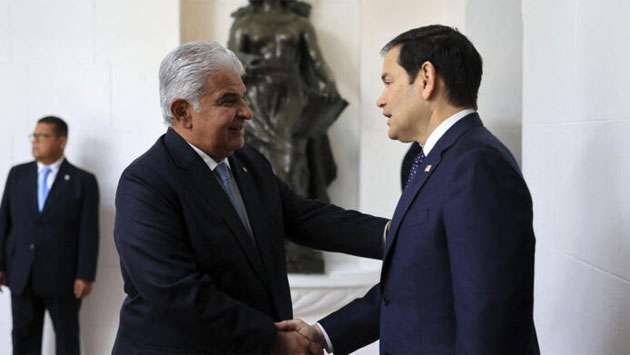Panama will take action on Sunday without immediate changes to its tariffs, US Secretary of State Marco Rubio threatened, but the country’s leader insisted he was not afraid of a US invasion and that negotiations were underway.
Rubio, who was making his first foreign trip as the US’s top diplomat, told Panama that President Donald Trump had decided that the country had to meet the terms of the agreement that returned the crucial waterway in 1999.
He has pointed to China’s “influence and control” over the canal, a vital link between the Atlantic and Pacific oceans, through which about 40 percent of U.S. container traffic passes.
Rubio, who met with President Jose Raul Mulino, “made it clear that this situation is unacceptable and that if changes are not made immediately, the United States will have to take the necessary steps to protect itself under the agreement,” State Department spokeswoman Tammy Bruce said.
Mulino painted a bleak picture of the meeting. He welcomed Rubio to his official residence in the tropical capital’s old quarter, flanked by a guard outside its whitewashed walls.
“I don’t feel that there is a threat at this time to the agreement, its validity, or the use of military force to obtain the canal,” Mulino later told reporters, referring to the agreement signed in late 1999.
“The canal is not an issue,” Mulino said.
Technical talks with the United States were proposed to resolve the issues.
Rubio did not specify what steps the United States might take. Trump has already imposed steep tariffs on the three largest U.S. trading partners: Canada, China and Mexico.
Rubio and Trump say China has gained significant control over the canal’s infrastructure, which could be closed in a potential conflict that could have devastating consequences for the United States.
Protests against Rubio
Panama saw small but violent protests before Rubio’s visit, with police firing tear gas.
Protesters burned an effigy of Rubio, dressed in a red, white and blue suit, and created pictures of him and Trump in front of a Nazi flag.
“Rubio, get out of Panama!” The former senator was met by about 200 protesters who failed to fight back as police blocked his way into the old city.
“To the imperial messenger,” union leader Sol Mendez Rubio said, “we reiterate that we are not here for Trump. Panama is a free and sovereign nation.”
In response to pressure, Mulino ordered an audit of a Hong Kong-based company that controls ports on both sides of the canal.
But speaking to reporters, he said the concessions made for the canal up to Trincomalee were insufficient and “we should withdraw them.”
The Panama Canal, which Trump has called the modern “world’s anchor,” was built by the United States at the expense of thousands of workers, mostly people of African descent from Barbados, Jamaica and the Caribbean.
The United States maintained control of the canal when it opened in 1914, but Panamanians, angered by foreign rule, began negotiations in 1964 after deadly riots.
Jimmy Carter sealed the deal that gave the canal to Panama in late 1999, seeing a moral imperative for the United States to respect the late but still sovereign country.
Trump is taking a very different approach, returning to the “big stick” approach of the early 20th century, threatening to force the United States to get its way by force, especially in Latin America.
After complaints that Colombia’s leftists were being treated poorly, Trump prepared to impose massive tariffs on Colombia in his first week in office to force the U.S. ally to repatriate deported citizens by military aircraft.
Rubio, the first Hispanic secretary of state and a devout Catholic, began his Sunday in Panama City by attending a service at a church built four years ago in the old city.
He will visit four other Latin American countries — El Salvador, Costa Rica, Guatemala and the Dominican Republic — where he will seek cooperation on Trump’s priority of deporting immigrants from the United States.



